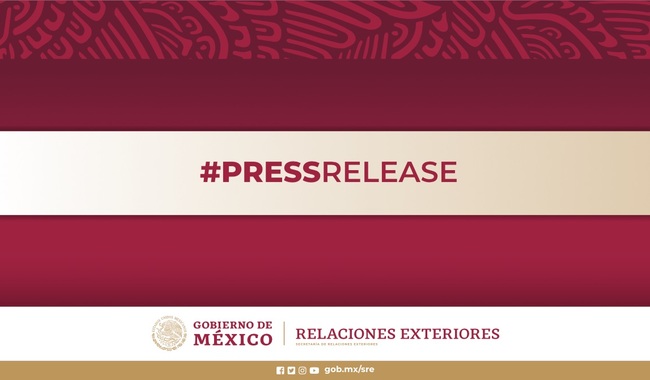The Government of Mexico has instructed Ambassador Raquel Serur Smeke to return to Mexico in order to protect her safety.
Since presenting her diplomatic credentials to the Government of Ecuador on June 18, 2019, Ambassador Serur Smeke has done outstanding diplomatic work to deepen the political dialogue between Mexico and Ecuador and has always provided prompt assistance to the Mexican community there. During her time in Ecuador, there have been three presidential visits to the country, with the possibility of a fourth. The business sectors of both countries strengthened their ties, and cultural exchanges were intensely promoted. Ambassador Serur Smeke's actions were in line with the foreign policy principles established in Political Constitution of the United Mexican States and international law at all times. Therefore, the declaration is clearly of a political nature.
The Mexican Embassy in Ecuador will be headed by Minister Roberto Canseco, currently deputy chief of mission, and will continue to operate normally in order to serve the needs of the Mexican community there. Mexico deplores this diplomatic decision, which it considers disproportionate.
Mexico further reports that, after a thorough analysis of the information received, the Government of Mexico has decided to grant political asylum to Jorge David Glas Espinel, who is currently at the Embassy of Mexico in Quito. This will be officially communicated to the Ecuadorian authorities, along with the request to grant the respective safe-conduct, in accordance with the 1954 Convention on Diplomatic Asylum, an international treaty to which Mexico and Ecuador are States parties. According to the provisions of the Convention, the State granting asylum—in this case, Mexico—is the only one empowered to determine the motives for the persecution of political asylum seekers (Article IV); its decision to continue the asylum shall be respected by the territorial State—in this case, Ecuador (Article IX) and, once asylum is granted, the State granting asylum may request that the asylee be allowed to depart for foreign territory, and the territorial State is under obligation to grant immediately the necessary safe-conduct.
In addition, the Government of Mexico condemns the increased presence of Ecuadorian police forces outside the Embassy of Mexico in Quito, which, according to statements made by Ecuadorian authorities, is a measure of dissatisfaction and rejection of statements made by Mexican authorities. This clearly constitutes harassment of Mexico’s embassy and is a flagrant violation of the Vienna Convention on Diplomatic Relations. These actions plainly do not correspond to the usual practices of security and protection of diplomatic properties, based on the norms that regulate the good coexistence between nations.
The Government of Mexico demands from Ecuador respect for our sovereignty and the right to asylum, compliance with its international obligations to guarantee the inviolability of diplomatic missions, and a halt to this policy of harassment and intimidation. If this situation continues, Mexico will hold Ecuador responsible for any damage to the diplomatic premises, or harm to its accredited personnel and any individual under the protection of the Mexican State in that country.
